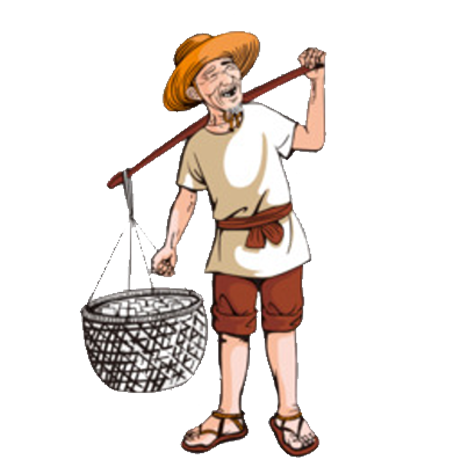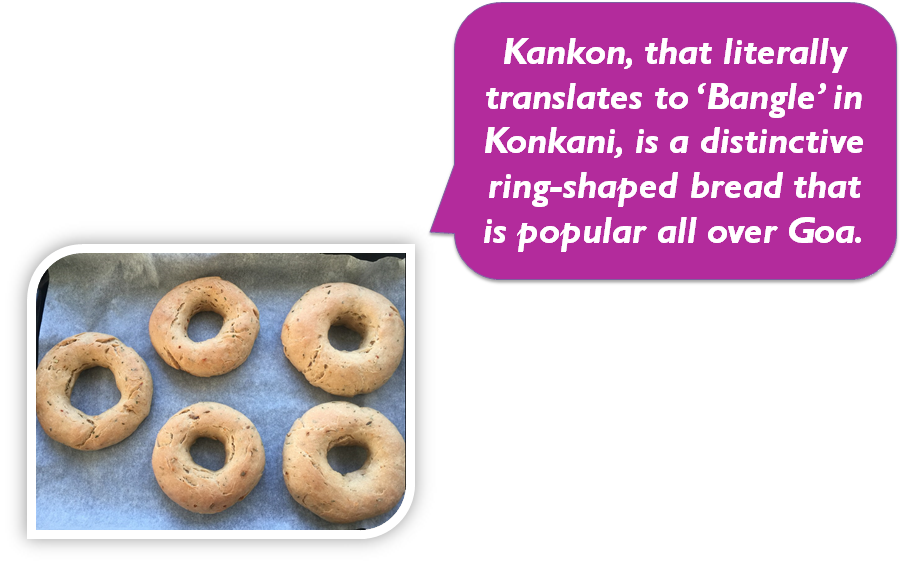Class-X-Chapter-7 (First Flight)- "Glimpses of India " - Part I- "A baker from Goa "- By Lucio Rodrigues
Glimpses of India (Part 1) A Baker from Goa
By Lucio Rodrigues
This is a pen-portrait of a traditional Goan village baker who still has an important place in his society

" A Baker from Goa"- Introduction
‘A Baker from Goa’ revolves around the relevance of a baker in the Goan culture which dates back to the time when Portuguese ruled over the city of Goa. The Portuguese may have left but the bread-makers continue to have an inevitable stature. In this story, the author recalls his childhood days and their excitement on seeing the baker. They were enthusiastic to the point that they would run to him as soon as they woke up without even brushing their teeth.
" A Baker from Goa"- Summary
The lesson begins with how narrator’s elders often recall the time when Goa was under the rule of the Portuguese. They talk how the importance of bakers is still maintained in their villages even after the Portuguese have left. They are known as ‘Paders’ in Goa. The mixers, moulders and their time-tested furnaces continue to serve the people of Goa with their famous bread loaves. It is possible that the original ones may not exist, but their profession is being continued by their sons. The thud of their bamboo stick can still be heard in some parts of the village. The same jingling thud would wake the narrator and his friends during their childhood days who would go running to him without brushing or washing their mouth properly. It was the maid-servant of the house who collected the loaves while children sorted out the bread bangles for themselves. Bakery products have importance in the culture and traditions of Goa. Bol or sweet bread is a part of marriage gifts, cakes and Bolinhas or coconut cookies are eaten at every festival and the lady of the house prepares sandwiches at her daughter’s engagement. Earlier bakers wore a unique frock of knee-length known as ‘kabai’ but during the narrator’s childhood days, they wore a shirt and trousers of length slightly shorter than the usual ones. They generally collected their bills at the end of every month. Bakery has continued to be a profitable profession, managing to keep their families joyous and prosperous.
TEXT & Explanation
OUR elders are often heard reminiscing nostalgically about those good old Portuguese days, the Portuguese and their famous loaves of bread. Those eaters of loaves might have vanished but the makers are still there. We still have amongst us the mixers, the moulders and those who bake the loaves. Those age-old, timetested furnaces still exist. The fire in the furnaces has not yet been extinguished. The thud and jingle of the traditional baker’s bamboo, heralding his arrival in the morning, can still be heard in some places. Maybe the father is not alive but the son still carries on the family profession. These bakers are, even today, known as pader in Goa.
Reminiscing nostalgically- thinking fondly of the past
The story takes us back to the time when Portuguese ruled Goa. They were immensely famous for their breads. The narrator often finds his elders thinking about ‘those good old days’ and telling them that the famous breads date back to the time when Portuguese ruled over Goa. They ponder over the past and tell them that though the Portuguese have left Goa but the bakers of bread still exist, if not the original ones, their legacy is being continued by their sons. The bakers are still being referred to as ‘Paders’. Everything about baking is still the same; ranging from those who mould the bread loaves, to the furnaces which have survived the ravages of time. The sound of their arrival and the thud of their bamboo stick can still be heard just like the olden times.

During our childhood in Goa, the baker used to be our friend, companion and guide. He used to come at least twice a day. Once, when he set out in the morning on his selling round, and then again, when he returned after emptying his huge basket. The jingling thud of his bamboo woke us up from sleep and we ran to meet and greet him. Why was it so? Was it for the love of the loaf? Not at all. The loaves were bought by some Paskine or Bastine, the maid-servant of the house! What we longed for were those bread-bangles which we chose carefully. Sometimes it was sweet bread of special make.
he narrator recalls that the baker acted as their friend and companion during their childhood days in Goa. The baker used to visit twice a day; once, while he was on the round to sell his loaves and the other time, while returning back with his empty basket, having sold all the loaves. It was the sound of his bamboo stick that woke the children up. The children were so excited to meet him and choose from the bread bangles or Kankon he made especially for them. While the bangles were for children, loaves were for the adults that were generally collected by the maid-servant of the household.

The baker made his musical entry on the scene with the ‘jhang, jhang’ sound of his specially made bamboo staff. One hand supported the basket on his head and the other banged the bamboo on the ground. He would greet the lady of the house with “Good morning” and then place his basket on the vertical bamboo. We kids would be pushed aside with a mild rebuke and the loaves would be delivered to the servant. But we would not give up. We would climb a bench or the parapet and peep into the basket, somehow. I can still recall the typical fragrance of those loaves. Loaves for the elders and the bangles for the children. Then we did not even care to brush our teeth or wash our mouths properly. And why should we? Who would take the trouble of plucking the mango-leaf for the toothbrush? And why was it necessary at all? The tiger never brushed his teeth. Hot tea could wash and clean up everything so nicely, after all!
The baker often made a musical entry with his bamboo stick. His one hand supported the basket on his head while the other banged the bamboo on the ground. He would go house to house and greet the ladies before handing them over the loaves. The parents would scold the children and make them stand aside. But as eager as they were, they would climb a bench or the wall to peep into the basket. They did not even bother to brush their teeth before having those bread bangles because it seemed unnecessary effort for them to pluck mango leaves from the branches to use them for brushing the teeth. They considered brushing unnecessary because the hot tea could effortlessly wash their mouth and they thought that animals like the tiger never brushed their teeth.
Marriage gifts are meaningless without the sweet bread known as the bol, just as a party or a feast loses its charm without bread. Not enough can be said to show how important a baker can be for a village. The lady of the house must prepare sandwiches on the occasion of her daughter’s engagement. Cakes and bolinhas are a must for Christmas as well as other festivals. Thus, the presence of the baker’s furnace in the village is absolutely essential.
Bread is an important part of the Goan culture and it is evident from its presence at every important occasion. From sweet breads at marriages to sandwiches at engagement parties and cakes and coconut cookies at Christmas as well as other occasions, makes the presence of a baker in every village, very essential.
The baker or bread-seller of those days had a peculiar dress known as the kabai. It was a singlepiece long frock reaching down to the knees. In our childhood we saw bakers wearing a shirt and trousers which were shorter than full-length ones and longer than half pants. Even today, anyone who wears a half pant which reaches just below the knees invites the comment that he is dressed like a pader!


The baker had a way of making monthly record of bills on a wall using a pencil and then, collecting the money at the end of the month. Baking has always been a profitable profession. The baker’s family and workers have always been happy and joyous. The baker was usually fat which was proof that he had a lot to eat and hence, was a proof of his richness. Even to this day, someone with a well-built body is compared to a baker.
TEXT BOOK - Question and Answers
Q5. Match the following. What is a must
- as marriage gifts? – cakes and bolinhas
- for a party or a feast? – sweet bread called bol
- for a daughter’s engagement? – bread
- for Christmas? – sandwiches
Answer:-
As marriage gifts | Sweet bread called bol |
For a party or a feast | Bread |
For daughter’s engagement | Sandwiches |
For Christmas | Cakes and bolinhas |
Q6. What did the bakers wear:
- In the Portuguese days?
- When the author was young?
Q. Which of these statements are correct?
- The pader was an important person in the village in old times.
- Paders still exist in Goan villages.
- The paders went away with the Portuguese.
- The paders continue to wear a single-piece long frock.
- Bread and cakes were an integral part of Goan life in the old days.
- Traditional bread-baking is still a very profitable business.
- Paders and their families starve in the present times.
True
True
False, they still exist in Goan villages.
False, they wear shirts and trousers that are shorter than the usual ones and longer than the half-pants.
False, they are still an integral part of Goan culture.
True
False, it is still a very profitable business and their families are happy and prosperous.
. Bread is an important part of the Goan culture and it is evident from its presence at every important occasion. From sweet breads at marriages to sandwiches at engagement parties and cakes and Bolinhas at Christmas as well as other occasions, makes the presence of a baker in every village, very essential.
Tick the right answer. What is the tone of the author when he says the following?
- The thud and the jingle of the traditional baker’s bamboo can still be heard in some places. (nostalgic, hopeful, sad)
- Maybe the father is not alive but the son still carries on the family profession. (nostalgic, hopeful, sad)
- I still recall the typical fragrance of those loaves. (nostalgic, hopeful, naughty)
- The tiger never brushed his teeth. Hot tea could wash and clean up everything so nicely, after all. (naughty, angry, funny)
- Cakes and bolinhas are a must for Christmas as well as other festivals. (sad, hopeful, matter-of-fact)
- The baker and his family never starved. They always looked happy and prosperous. (matter-of-fact, hopeful, sad)
Answers-
- Nostalgic
- Nostalgic
- Nostalgic
- Funny
- Matter-of-fact
- Matter-of-fact
Question 2. Our elders are often heard reminiscing nostalgically about those good old Portuguese days, the Portuguese and their famous loaves of bread. Those eaters of loaves might have vanished but the makers are still there. We still have amongst us the mixers, the moulders and those who bake the loaves. Those age-old, time- tested furnaces still exist. The fire in the furnaces has not yet been extinguished. The thud and jingle of the traditional baker’s bamboo, heralding his arrival in the morning, can still be heard in some places. May be the father is not alive but the son still carries on the family profession.
Question 3. He would greet the lady of the house with ‘Good Morning’ and then place his basket on the vertical bamboo. We kids would be pushed aside with a mild rebuke and the loaves would be delivered to the servant. But we would not give up. We would climb a bench or the parapet and peep into the basket, somehow. I can still recall the typical fragrance of those loaves. Loaves for the elders and bangles for the children.
Question 4. Marriage gifts are meaningless without the sweet bread known as the ‘bol’, just as a party or a feast loses its charm without bread. Not enough can be said to show how important a baker can be for a village. The lady of the house must prepare sandwiches on the occasion of her daughter’s engagement. Cakes and bols are a must for Christmas as well as for other festivals. Thus, the presence of the baker’s furnace in the village is absolutely essential.
Short Answer Type Questions
Long Answer
Type Questions (100-120 words)
Answer: The author tells us that bread is an indispensable part of the life of the Goan people since the time of the Portuguese. Bread is a part of not only everyday life but also of festive occasions and events. For each occasion there was a special kind of bread. He also tells us that the baker had leading role in the society was so important in the life of the Goans that they got up with the jingling sound of his bamboo. He also tells us that the baker wore either a Kabai, i.e., a long frock or a shirt and a half pant like trousers.
The author seems to be very observant because not only does he know all this
but also knows the profit-making in it as he says that in those days, the baker
was very prosperous and never starved. He also knew that they maintained monthly
bills on the walls. Such strong observation powers would definitely be
beneficial for children as they would become aware of citizens of their
neighbourhood.
Question 6. After reading the story ‘A Baker from Goa”,
do you think our traditions, heritage, values and practices are the roots that
nourish us? Why/why not?

Comments
Post a Comment